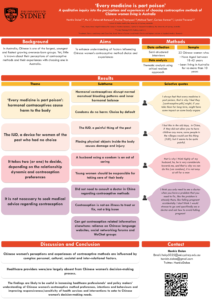 This poster was presented by Ms Hankiz Dolan at the 10th International Shared Decision Making Conference in Quebec, Canada, 7-10 July 2019. (PDF)
This poster was presented by Ms Hankiz Dolan at the 10th International Shared Decision Making Conference in Quebec, Canada, 7-10 July 2019. (PDF)
Dolan H, Li M, Bateson D, Thompson R, Tam M, Bonner C, Trevena L. ‘Every medicine is part poison’. A qualitative inquiry into the perceptions and experiences of choosing contraceptive methods of Chinese women living in Australia [poster]. 10th International Shared Decision Making Conference. Université Laval, Quebec City, Canada. 2019 July 7-10.
Abstract
Background
Decisions about contraceptive methods are preference sensitive and ideal for shared decision-making (SDM). Migrant and refugee women are vulnerable in terms of accessing evidence-based and culturally and linguistically sensitive contraception information and services. In Australia, Chinese is one of the largest, youngest and fastest growing overseas-born groups. Yet, less is known about their decision-making needs when faced with choosing a contraceptive method.
Aim
Explore Chinese women’s information, communication and support needs when choosing contraceptive methods.
Methods
We conducted semi-structured in-depth interviews with 22 women from Chinese background, aged between 18 and 45 and who had been living in Australia for no more than 10 years. The sample consisted of international students and immigrants with a variety of relationship status. We adapted our interview guide from the Ottawa Decision Support Framework. Interview audio-recordings were transcribed verbatim and will be analysed using thematic analysis approach.
Results
This study is ongoing, and results will be updated. Overall, condom and withdrawal methods were commonly known and used by Chinese women because of their convenience, easy access and also because of Chinese women’s lack of knowledge about other available methods. There is a lack of awareness of the role of general practitioners and other healthcare providers role in assisting the decision-making about contraceptive methods. There is also a reluctance to accept hormonal contraceptive methods due to fear of side effects, such as reduced menstrual bleeding, pain, weight gain and effect on future fertility. Participated indicated relying on information from Chinese websites from China or Chinese social media platforms or friends. Some women who’ve sought medical advice from doctors expressed feelings of not being well informed about side-side effects, which contributed to them discontinuing with the chosen method.
Conclusions
The study results highlight the need for improved, linguistically and culturally appropriate contraceptive method decision support strategies for Chinese women. Use of Chinese language decision aid tools along with preferences, concerns and values clarification exercises are likely to be useful.
